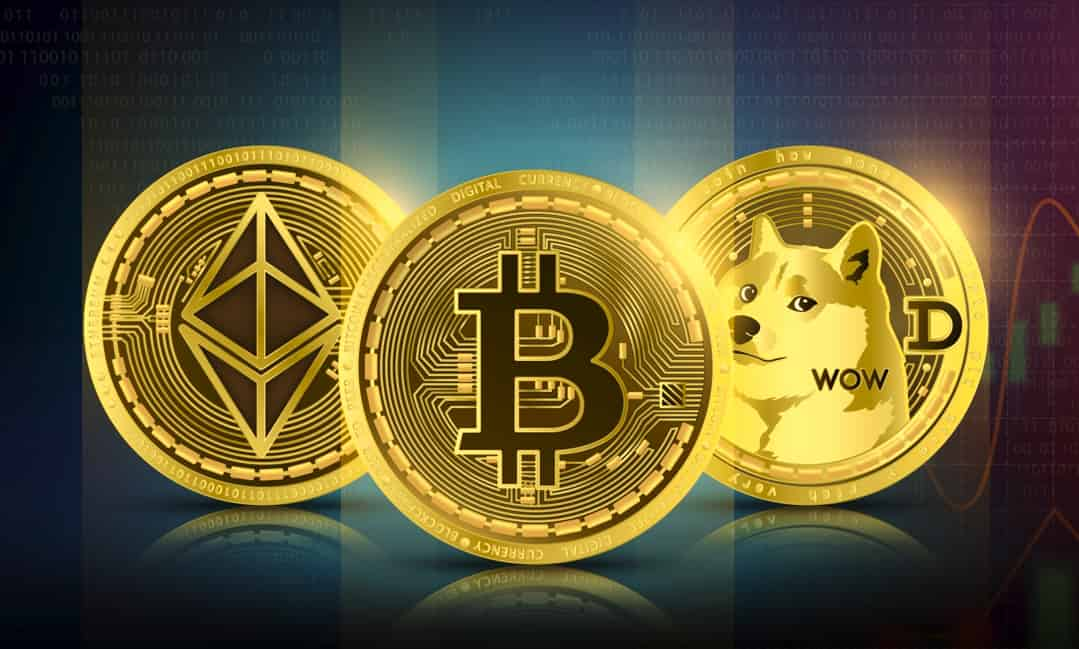As of May 2022, the total cryptocurrency market cap — the total value of a cryptocurrency as calculated by multiplying the price of the crypto with the number of coins in existence — is $1.23 trillion, an impressive statistic considering that the crypto market didn’t exist before 2009.
Market cap is the best indicator to understand the state of the crypto market as a whole in comparison to other financial asset classes. It’s also a good metric to see which individual cryptocurrencies, among the 20,000 currently listed on sites like CoinMarketCap, are the most popular.
In this guide, we’ll take you through the top cryptocurrencies by market cap and why they’re on the top of the list.
Bitcoin (BTC)
Bitcoin (BTC) launched as the first cryptocurrency in January 2009 and has topped the list of cryptocurrencies for years. BTC is interesting because its creator is an anonymous individual or group of developers called “Satoshi Nakamoto” that has stayed out of the spotlight despite Bitcoin’s popularity.
The Bitcoin blockchain is the world’s first decentralized blockchain. This transparent, decentralized ledger lets anyone send and receive data (i.e., crypto transactions) without a third-party company or bank. Now, banks are scrambling to catch up to Bitcoin and other cryptocurrencies.
BTC has a couple of use cases. First, many people and nation-states like El Salvador and the Central African Republic are interested in using it as a reserve currency. Corporate and government treasuries have Bitcoin on their balance sheets.
The U.S. Dollar is the world’s most dominant reserve currency, followed by the Euro. However, BTC could significantly rival these currencies one day, as increased adoption and liquidity will help decrease price volatility. Many prominent Bitcoin supporters like Michael Saylor refer to it as digital gold — a store of value to hedge against inflation of fiat currencies.
Ethereum (ETH)
Vitalik Buterin came up with the idea of Ethereum in 2013. He was a computer programmer and contributor to Bitcoin Magazine, who advocated for more functionality on the Bitcoin blockchain to make it easier for developers to build applications.
In July 2015, Buterin and other developers launched Ethereum as the first blockchain to support innovative contract technology — a computer program that executes a transaction after a series of requirements are met.
Smart contracts enabled Ethereum to become the number one blockchain for decentralized applications (dApps), greatly expanding the use cases and shaping the future of digital currency.
Today, Ethereum supports a variety of dApps such as decentralized exchanges, lending/borrowing protocols, NFT marketplaces, and more.
Smart contracts also allow developers to create cryptocurrencies (known as ERC-20 tokens), which run on the Ethereum blockchain. Today’s most popular DeFi tokens use the ERC-20 token contract standard. Examples include Aave (AAVE), MakerDAO (MKR), Uniswap (UNI), and 1inch (1INCH).
ETH — commonly called Ether — is the native currency of the Ethereum blockchain. Each transaction on the Ethereum blockchain requires ETH to pay for gas fees — fees paid to miners responsible for validating transactions on the network. For example, users who want to send UNI tokens from one wallet to another need to have ETH to pay transaction fees. Users who wish to use the Uniswap exchange to initiate a trade also need ETH. Needing ETH to pay gas fees gives the coin great utility.
Gas fees on Ethereum are notoriously high — averaging over $100 for some types of transactions. These increased costs have allowed competing blockchains and cryptocurrencies to gain greater adoption.
Binance Coin (BNB)
Binance Coin (BNB) is the native cryptocurrency of the Binance exchange and BNB Chain. Initially, BNB started as an ERC-20 token on the Ethereum blockchain. Later, Binance introduced its blockchain called BNB Chain (formerly Binance Smart Chain).
Although it hasn’t existed for as long as Ethereum, the Binance dApp ecosystem is quite large. The most notable example is the PancakeSwap decentralized exchange, which makes it possible to trade any token that runs on BNB Chain. Like ETH on Ethereum, users need BNB to pay for gas fees on BNB Chain.
XRP (XRP)
XRP is the native cryptocurrency for products from Ripple Labs, Inc. A fundamental value proposition of XRP is its minuscule gas fees and speedy transaction finality of under five seconds.
Ripple developed RippleNet — a network of institutional payment providers such as banks and money services businesses to support ecosystem growth. RippleNet offers on-demand liquidity (ODL), which removes the need for pre-funding in cross-border transactions. For instance, a U.S. retailer who receives a payment from a European customer likely prefers to receive U.S. Dollars rather than Euros. ODL uses XRP as a bridge to facilitate the transaction.
XRP also has its open-source blockchain — XRP Ledger — that uses the XRP coin as its native asset. XRP Ledger powers use cases such as micropayments, DeFi applications, non-fungible tokens (NFTs), and more.
Cardano (ADA)
Cardano is a Proof-of-stake (PoS) blockchain platform that aims to “redistribute power from unaccountable structures to the margins to individuals” — helping to create a more secure, transparent, and fair society.
Users who hold the ADA coin can stake to earn rewards and vote on any proposed changes to the network.
In September 2021, Cardano officially completed its Alonzo hard fork, which brought smart contract functionality to the network. This upgrade allowed developers to build dApps such as SundaeSwap — a decentralized exchange for the Cardano ecosystem.
Cardano has partnered with the Ethiopian government to create a blockchain-based national ID system. The project has also partnered with a Wyoming-based traceability solution company Beefchain which helps ranchers tackle food security problems.
Solana (SOL)
Solana facilitates decentralized app creation. Unlike most blockchains, Solana uses a hybrid consensus model that combines Proof-of-Stake (PoS) and a unique algorithm called Proof-of-History (PoH), which helps the network become more scalable.
Solana has low gas fees and can process a theoretical limit of 65,000 transactions per second which helped it become one of the largest DeFi ecosystems.
The network’s scalability is 10,000 times higher than Bitcoin and 4,000 times higher than Ethereum. However, Solana has crashed on several occasions due to many simultaneous transactions from bots.
The SOL coin has two primary use cases. First, users can stake SOL to earn rewards for helping to validate transactions on the network. Second, Solana apps require SOL to pay for gas fees.
Dogecoin (DOGE)
In 2013, Dogecoin started as a joke but eventually turned into a real cryptocurrency. It all started when Jackson Palmer created DOGE based on the viral meme of a Shiba Inu dog.
Although Dogecoin started as a joke on Twitter, it went viral and inspired hundreds of new meme coins. Some popular examples include Shiba Inu (SHIB), Dogelon Mars (ELON), and MonaCoin (MONA).
While Dogecoin isn’t as technologically advanced as most other cryptocurrencies, its place in pop culture is unrivaled. Elon Musk, Snoop Dogg, Lil Yachty, Kevin Jonas, and Gene Simmons have all talked about their support for DOGE.
Trade, Earn, and Borrow Crypto on Abra
Now that you know more about the top 10 cryptocurrencies by market cap download the Abra app and begin your crypto journey today!
Download AppAbout Abra
Established in 2014, Abra is on a mission to create a simple and honest platform that enables millions of cryptocurrency holders to maximize the potential of their assets. Abra enables both individuals and businesses to safely and securely buy, trade, and borrow against cryptocurrencies – all in one place. Abra’s vision is an open, global financial system that is easily accessible to everyone.
Why Abra
Based in the United States, Abra is available in over 150 countries and makes it easy to convert between crypto and a wide variety of local fiat currencies. With over 2MM customers, $7B in transactions processed, and $1.5B in assets under management, Abra continues to grow rapidly. Abra is widely loved and trusted – in April 2022, pymnts.com reviewed and rated Abra amongst the top 5 most popular crypto wallets in the market. Abra is backed by top-tier investors such as American Express Ventures and First Round Capital.
How Abra Protects Your Funds
Abra places clients’ financial objectives and security first. Abra practices a culture of risk management across all levels and functions within the organization.
Abra employs a state-of-the-art enterprise risk management framework that comprises a comprehensive set of policies, procedures, and practices detailing all applicable risk-related objectives and constraints for the entirety of the business. Abra has instituted a complete set of requisite systems and controls that continuously enforce these policies, procedures, and practices to manage all operations, including credit and lending. Abra’s independent Risk Committee comprises experienced compliance, risk, securities, and fraud operations professionals with backgrounds in industries ranging from traditional and digital assets banking, payments, remittance, to fintech.
Please visit our FAQ to learn more.


